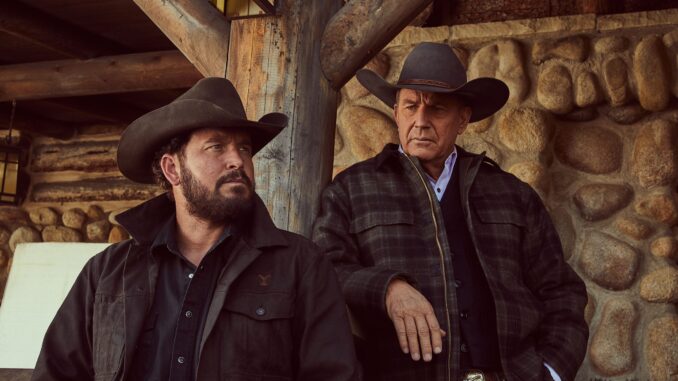
The Fading Echo of Geysers: Why Yellowstone Ended and Why the Story Isn’t Really Over
Yellowstone, the sprawling saga of warring ranchers, simmering family feuds, and the encroaching realities of modern America on a mythical landscape, seemingly ended. The finale, or rather, the pause, left audiences reeling, not just from cliffhangers, but from a sense of incompletion. The Dutton family’s fight for survival, their ruthless tactics, and the constant threat of losing their legacy abruptly halted, leaving many wondering: why did Yellowstone, as we knew it, end? And, more importantly, why is the story whispered to be far from over?
The most pragmatic reason for Yellowstone’s cessation lies in the behind-the-scenes drama. Kevin Costner, the undeniable star who embodied John Dutton’s stoic intensity and rugged charm, reportedly clashed with creator Taylor Sheridan over scheduling conflicts. Costner’s desire to focus on his passion project, “Horizon: An American Saga,” created a chasm too wide to bridge. The series, built so strongly upon his presence, simply couldn’t function at the same level without him. The Dutton patriarch, the axis around which all the chaos spun, was no longer a reliable fixture, forcing Paramount to re-evaluate the future of the show. In essence, the end of Yellowstone, as we knew it, was born from a perfect storm of creative differences and the complexities of Hollywood ego.
Beyond the immediate issue of Costner’s departure, the narrative had arguably begun to fray. While the initial seasons captivated viewers with their raw portrayal of frontier life clashing with contemporary issues, later installments felt increasingly convoluted. The introduction of new characters, often with hastily sketched backstories, diluted the focus on the core Dutton family dynamic. Subplots stretched to improbable lengths, and the escalating violence, initially shocking and impactful, risked becoming gratuitous. The story, once a tightly wound exploration of familial loyalty and land preservation, seemed to be unraveling, threatening to lose its thematic core. Perhaps the “ending” was a necessary course correction, a chance to revitalize the franchise before it succumbed to its own weight.
However, the story isn’t truly over. The Dutton saga, with its fertile ground for drama and its devoted fan base, is simply being reimagined. The announcement of a new series, tentatively titled “2024,” featuring Matthew McConaughey, indicates a strategic pivot rather than a full stop. This new iteration signals a continuation of the Yellowstone universe, potentially exploring the same themes of land, legacy, and the clash of cultures, but with a fresh perspective and a new generation of characters. It’s a chance to reboot the narrative, to prune away the excess and refocus on the elements that made Yellowstone so compelling in the first place.
Furthermore, the existing spin-offs, “1883” and “1923,” demonstrate the enduring appeal of the Dutton family history. These prequels delve into the origins of the Yellowstone Ranch, showcasing the hardships and sacrifices endured by previous generations to secure their foothold in the West. These stories enrich the original narrative, adding depth and context to John Dutton’s unwavering commitment to preserving his family’s legacy. By exploring the past, the Yellowstone universe continues to expand, offering viewers a more comprehensive understanding of the forces that shaped the present.
The “ending” of Yellowstone, therefore, feels less like a conclusion and more like an intermission. The core themes remain potent, the landscape continues to inspire, and the Dutton family legacy still holds a grip on the imagination. The story is not over because the fundamental conflicts – the struggle for survival in a rapidly changing world, the tension between tradition and progress, and the enduring power of family – are universal and timeless.
In conclusion, the cessation of Yellowstone in its original form stemmed from a confluence of factors, including behind-the-scenes drama and a perceived decline in narrative quality. Yet, the story’s underlying themes and enduring popularity ensured that the “ending” would be more of a transition than a final chapter. The Yellowstone universe, with its spin-offs and planned continuations, is poised to explore new territories, introduce new characters, and delve deeper into the complex tapestry of the American West. The echoes of geysers may have faded momentarily, but the rumbling beneath the surface promises a renewed eruption of drama, ambition, and the timeless struggle to define what it means to own a piece of the American dream. The story, it seems, is just getting started.
